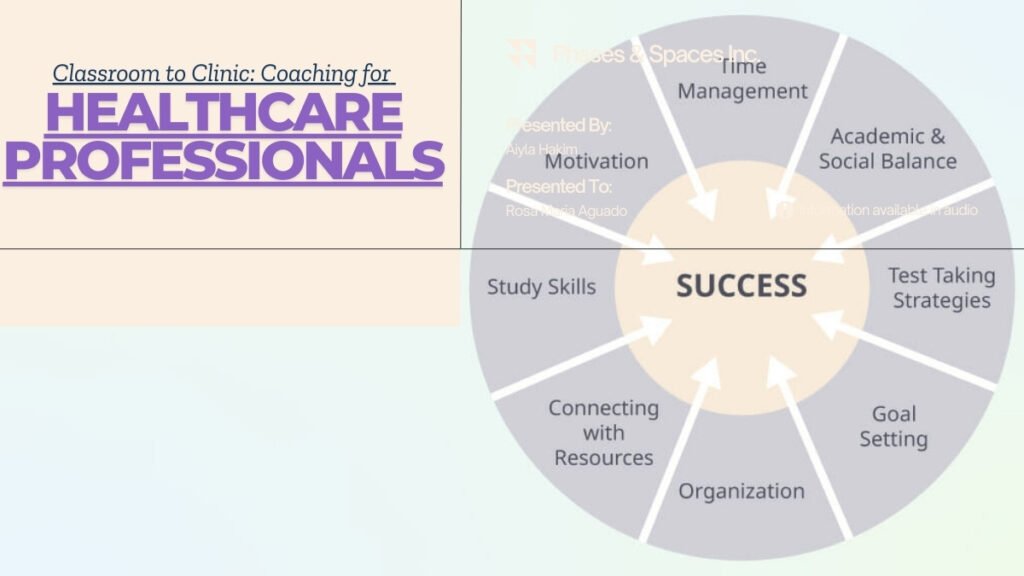

From Classroom to Clinic: Coaching for Healthcare Professionals in Educational Settings
Healthcare education has traditionally relied on two distinct modes: classroom-based theoretical instruction and hands-on clinical training. However, in today’s fast-paced and ever-evolving healthcare environment, the seamless transition from the classroom to the clinic is essential. Classroom-to-clinic coaching is emerging as a dynamic approach that supports this transition by integrating reflective, targeted guidance into both learning contexts. This article explores the rationale, key strategies, benefits, and challenges of implementing classroom-to-clinic coaching for healthcare professionals.
The Need for Integrated Coaching
As healthcare professionals progress from academic settings into clinical environments, they face a steep learning curve. While classroom education builds a foundation of knowledge, clinical practice demands the rapid application of that knowledge under pressure. Traditional didactic methods often fall short of preparing students for the complexities of patient care. Coaching bridges this gap by:
- Enhancing Active Learning: Coaching shifts the focus from passive content absorption to active, self-regulated learning. In the classroom, educators can model problem-solving approaches, which are then reinforced through guided clinical practice.
- Facilitating Reflective Practice: Structured coaching sessions encourage learners to reflect on their performance, identify gaps in knowledge, and adapt strategies accordingly.
- Fostering Professional Identity: The transition to clinical practice is not only about skill acquisition but also about forming a professional identity. Coaches play a vital role in guiding students through this transformation by reinforcing professional values and ethical standards.
Recent studies have underscored that coaching in medical education can significantly impact both clinical competency and professional identity formation, setting the stage for lifelong learning and improved patient care .
Key Components of Effective Coaching
Effective classroom-to-clinic coaching relies on several core practices that can be tailored to the healthcare education context:
1. Targeted Observation
Coaches begin by observing learners in both classroom simulations and real clinical settings. By collecting evidence through direct observation, video recordings, or reflective journaling, coaches can identify specific areas where students struggle to translate theory into practice.
2. Data-Driven Debriefing
After observations, structured debriefing sessions help learners understand the “why” behind their actions. During these conversations, coaches use collected data to highlight strengths and pinpoint opportunities for improvement. Debriefing becomes a two-way dialogue that not only informs but also empowers students to develop actionable learning plans.
3. Collaborative Co-Planning
Co-planning sessions involve the learner and coach working together to redesign learning strategies. In the classroom, this might involve tailoring study approaches, while in clinical settings, it can include refining patient interaction techniques or improving time management during procedures. This joint planning helps learners anticipate challenges and reinforces the practical application of classroom knowledge.
4. Assisted Performance Framework
Building on social learning theories, the assisted performance framework emphasizes gradual skill acquisition. Coaches support learners through a process that transitions from heavy guidance to independent performance. This scaffolding approach enables learners to practice skills with a safety net until they achieve competence.
Benefits for Healthcare Professionals
Implementing a structured coaching model that spans both educational settings offers several advantages:
- Improved Clinical Competency: With tailored feedback and repetitive practice under guided supervision, learners rapidly develop clinical skills.
- Enhanced Confidence and Reduced Anxiety: By receiving continuous support, students can approach clinical challenges with greater assurance.
- Promotion of Lifelong Learning: Coaching instills self-regulated learning habits, encouraging professionals to seek ongoing improvement throughout their careers.
- Strengthened Professional Identity: Through reflective dialogue and role modeling, coaching helps integrate the humanistic and ethical dimensions of patient care into the professional identity of healthcare workers.
Implementation Challenges and Future Directions
While the benefits are substantial, several challenges need to be addressed to optimize classroom-to-clinic coaching:
- Resource Allocation: Effective coaching requires dedicated time from experienced educators, which may necessitate institutional changes in faculty workload.
- Scalability: Scaling personalized coaching to larger cohorts can be challenging. Institutions may need to explore group coaching or peer-to-peer coaching models to extend reach without compromising quality.
- Sustaining Engagement: Long-term coaching success depends on maintaining both coach and learner engagement. Regular professional development and feedback loops for coaches can help sustain a robust coaching culture.
Future research should focus on quantifying the long-term impact of integrated coaching models on patient outcomes and professional development.
Conclusion
Classroom-to-clinic coaching represents a promising shift in healthcare education—one that addresses the critical need to bridge theoretical learning and practical application. By incorporating targeted observation, data-driven debriefing, collaborative co-planning, and an assisted performance framework, educational institutions can prepare healthcare professionals to thrive in complex clinical environments. As coaching becomes more deeply embedded in the continuum of healthcare education, it not only improves clinical competency but also fosters a culture of continuous improvement and professional identity formation cite .
Embracing this integrative approach may well be the key to producing healthcare professionals who are as adept at critical thinking in the classroom as they are at delivering compassionate, effective care in the clinic.